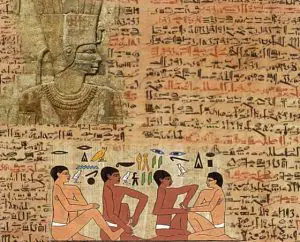A Brief Look into Ancient Egyptian medical practitioners and their practices
Ancient Egyptian doctors were at that time the best in the world. Historically, ancient Egyptian medicine was a specialty that was making rapid strides. Even then, scientific methodologies were adopted by physicians and researchers to study the effects of a medicine.

Inventions created the need to have an institution supporting it. The School of Medicine in ancient Egypt was an offspring of that idea. Some notable medical institutions that educated ancient Egyptian doctors were Per Bastet, Abydos, and Sais.
Training in Medicine Given to Doctors in Ancient Egypt
Special schools in Egypt trained Egyptian doctors in medicine. Translated into English as Houses of Life, these centers of excellence were setup to give doctors hands-on experience. It was also setup to help doctors put into practice their formal education in medicine.
Students used medical material written on stone slabs (later on papyrus and wood) as a reference. The medical material was prepared by physicians. The material was a guideline to manage a patient’s health conditions.
Categories of Egyptian Doctors
Priests were regarded as the perfect custodians of medical care and they were given education in medicine on a priority basis. Scribes have indicated that the doctoral system was dictated by a hierarchy. Doctors were presided by seniors. There were helpers and overseers. Overseers would constantly keep a watch on the patient, checking their heartbeats and respiratory condition.
The highest rank in the Doctor community was given to the chief of physicians. However, there are indications that a specially appointed minister from the kingdom overlooked the doctors.
Although specialization was uncommon, generalization was a common thing. Ancient Egyptian doctors were expected to know on all types of diseases. With time, specialization became favored as the collective consensus came to understand that each branch of medicine had the depth to support specialization.
Physicians and doctors were highly revered in ancient Egypt. They were also rewarded handsomely by the rich people. Doctors were even equated to God, so much so that around 2700 BC, the physician Imhotep was bestowed the status of God of medicine.
Human Body Concepts
The Egyptians compared the human body to the Nile. They equated the interconnecting streams of the Nile and canals of their region to how the human body worked. The heart was considered the main organ and all physiology was pertinent to the functioning of the heart.
The heart also had spiritual connotations. It was the window to the soul and regularly communicated to the soul of the person. The menu or links that flowed from a heart, were compared to the complex channels of the Nile that supplied water to the people.
Egyptians believed that the channels (arteries and veins) of the heart, also carried air. Ancient Egyptian doctors/physicians often adopted a holistic approach to treat a health condition due to this belief.
